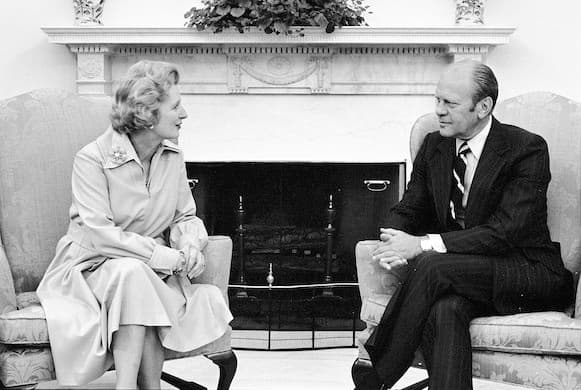When Presidents Could Be Quietly Effective
Biographies like Smith’s and Liebmann’s yearn for presidents such as Taft and Ford, who spent more time on the substance rather than the presentation of public policy.

‘Dinner with the President: Food, Politics, and a History of Breaking Bread at the White House’
By Alex Prud’homme
Knopf, 512 pages
‘An Ordinary Man: The Surprising Life and Historic Presidency of Gerald R. Ford’
By Richard Norton Smith
Harper, 832 pages
‘The Tafts’
By George W. Liebmann
Twelve Tables Press, 432 pages
“I happen to be the nation’s first instant vice president,” Gerald Ford said, adding that he preferred “instant coffee and instant oatmeal.” How much do such plain tastes actually tell us about a president — in this case one who was appointed to office, becoming commander-in-chief without being elected?
The “ordinary” Gerald Ford liked to joke about himself, but in his case self-deprecation did not work politically — the way it did for JFK, who could joke about being the man who “accompanied Jacqueline Kennedy to Paris,” knowing that such humor only increased his charisma.
That Richard Norton Smith does not consider Gerald Ford a joke is evident not only in his book’s subtitle but in his epigraph, from Emerson: “Nothing astonishes men so much as common sense and plain dealing.”
Mr. Norton believes that Ford, the “least self-dramatizing of men long before ‘No Drama Obama’ … guided the nation through its worst constitutional crisis since the Civil War.” Ford has not been recognized as such because his brand of bland authority went unappreciated during what Mr. Norton terms the Shakespearean reigns of rapacious Richard Nixon and Ronald Reagan, the Great Communicator.
Ford’s policies and staff prepared the way for Reagan, Mr. Smith points out. Some of the accidental president’s best actions look even better today — such as his insistence on shaming a reluctant Congress to resettle the Vietnamese refugees: “To do less, Ford argued, was to add moral bankruptcy to military defeat.”
Whatever you think of Ford’s pardon of Nixon, Mr. Smith believes the decision was courageous. Ford’s farsighted support of the Helsinki Accords — controversial during his term of office — has bolstered current day efforts to protect the post-war boundaries in Europe.
Mr. Smith’s biography joins a growing shelf of books about non-imperial presidents who have been devalued — such as McKinley, Coolidge, and Cleveland — or even scorned, as in the cases of Harding and Carter.
Add to the stock of biographies arguing against self-dramatization in the presidency George W. Liebmann’s “The Tafts,” a five-generation saga that, he contends, “may well be greater” than the legacy of more prominent political families: the Adamses, Rockefellers, Kennedys, and Roosevelts.
Mr. Liebmann’s mission, though, is more than an effort to show that in certain important respects, William Howard Taft was a more effective progressive than the blustery Theodore Roosevelt; that Robert Taft — too often dismissed as a hidebound conservative — supported collective bargaining and publicly opposed the internment of the Japanese; and that other Tafts, serving in the high offices of government, accomplished more than their publicity seeking contemporaries.
“The Tafts” is an all-out attack on the age of social media, in which the aggrandizing voice dominates. The Tafts represent “cultivation of academic excellence in each generation, and an ethic of self-denial that led them to marry intelligently and avoid alcohol, financial, and sex scandals.” They are not, in the words of distinguished jurist Learned Hand, the “foolish tawdry moths who fly into publicity’s consuming fire.”
Mr. Liebmann writes in the vein of an old Testament prophet, deploring contemporary politics that “rest on defamation, not information, and in which the capacity to frame legislation giving clear guides to private behavior has vanished.” His approach is striking in an age of political biography that shies away from outright statements of moral authority. He laments a politics separated from personal probity.
What would Mr. Liebmann make of a book about dining at the White House? Is it a symptom of what is wrong with today’s political ethos, in which too much of what is said is not digested and assessed but only devoured?
Gerald Ford might be twitted about his preference for plain and instant food, but biographies like Mr. Smith’s and Mr. Liebmann’s yearn for presidents like Taft and Ford, who spent more time on the substance rather than the presentation of public policy that reflected their own modest but effective efforts to improve the polity.
Mr. Rollyson’s work in progress is “Making the American Presidency: How Biographers Shape History.”

